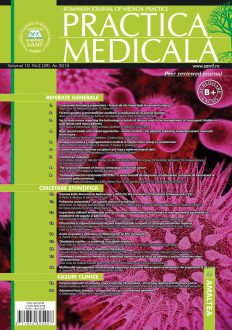SELECT ISSUE

Indexed

| |

|
|
|
| |
|
|
|

|
|
|
|
|
|
|
HIGHLIGHTS
National Awards “Science and Research”
NEW! RJMP has announced the annually National Award for "Science and Research" for the best scientific articles published throughout the year in the official journal.
Read the Recommendations for the Conduct, Reporting, Editing, and Publication of Scholarly work in Medical Journals.
The published medical research literature is a global public good. Medical journal editors have a social responsibility to promote global health by publishing, whenever possible, research that furthers health worldwide.
Basic special needs and related approaches – mainly medical – for patients following moderate/severe traumatic brain injury
Cristina POPESCU, Aurelian ANGHELESCU, Cristina DAIA and Gelu ONOSE
ABSTRACT
Traumatic brain injury (TBI) may affect almost every aspect of a person’s life. The relationships with family and friends, their roles and responsibilities, all, will require an adjustment period, preferably to be achieved one step at a time, with training and guidance of a specialized health care team.
Consequently, such neurologically severe impaired patients have almost always including long term needs, which are quasi-permanent or permanent so endured for a life time. The only way these special needs can be fulfilled or – at best made unnecessary – is the discovery of the way to cure the central nervous system lesions. Because medicine is unfortunately not there yet, this article will review the respective specific numerous long-term needs that may be met by the tools medicine has to offer today, aiming to improve health care in hospital units with rehabilitation profile and to provide ongoing guideline constructs for patients with TBI and their families, after discharge too, aiming at an as complete as possible family social and professional reintegration.
Post TBI evolution is influenced by a variety of factors making patients with brain injuries care a complicated and sustained process, the improvements being undoubtedly influenced by their multimodal way to be approached within interdisciplinary teams, applying individualized rehabilitation programs – all in purpose to reach a quasi-normal life or as close to its sense.
Keywords: long-term needs, disability, traumatic brain injury
